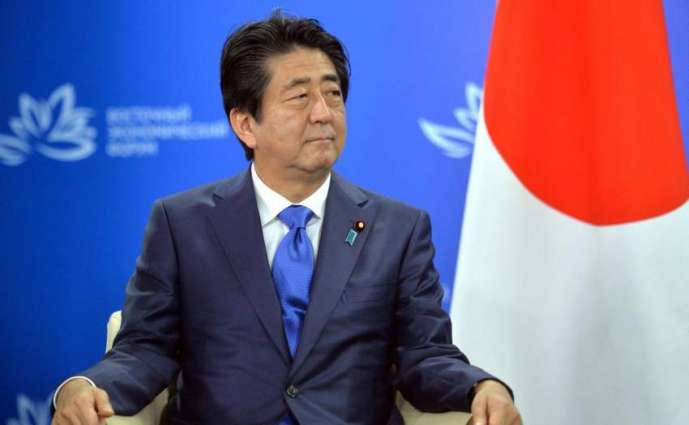Japanese Prime Minister Shinzo Abe's policy on Russia seems unlikely to deliver the promised peace treaty and an end to their territorial row, which, experts say, will affect his personal image and ties with Moscow.
MOSCOW (Pakistan Point News / Sputnik - 15th February, 2019) Japanese Prime Minister Shinzo Abe's policy on Russia seems unlikely to deliver the promised peace treaty and an end to their territorial row, which, experts say, will affect his personal image and ties with Moscow.
Russia and Japan never declared peace after World War II due to a dispute over the ownership of a chain of four islands, currently under Russia's control. Japan resumed talks on the treaty in 2016 in the hope of reclaiming the Southern Kurils, which Tokyo calls its Northern Territories.
Japan's Jiji news agency has recently reported that Abe is reviewing his negotiating strategy after his meeting with Russian President Vladimir Putin in January produced no major progress. The leaders are set to meet at the G20 Summit in Osaka in June. Abe reportedly planned to reach a framework agreement on the peace treaty there but has realized this is not feasible.
James Brown, associate professor and academic program coordinator for international affairs at the Temple University Japan Campus, told Sputnik that the impact of Abe's failure would likely be limited to his personal image.
"Abe has always presented himself as an experienced politician, who is skilled in the exercise of foreign affairs. The failure of his signature Russia policy may therefore dent this image. However, the failure to make progress on this issue is unlikely to do serious damage to the popularity of Abe and his LDP party," he said.
Former Russian Ambassador to Japan Alexander Panov echoed Brown in that Abe's failure to follow through on his much-touted eight-point plan on economic cooperation in exchange for territorial concessions would not affect his political career.
"Abe has already been reelected until the end of 2021, nothing notable can happen to him. But as a person, a politician who has made it his mission to resolve this [territorial] problem he will definitely lose face. He will feel it primarily as a major personal defeat," he said.
Brown suggested that the Japanese prime minister was coming to realize he had been too optimistic about his chances of reaching a territorial deal with Russia, but would not give up on the talks, which would amount to an admission of defeat.
"Abe has made relations with Russia one of the main features of his foreign policy. He has also often promised to make every effort to resolve the territorial issue before the end of his time in office. Giving up on the negotiations entirely would therefore be an admission of defeat and a personal embarrassment for him," he said.
It is therefore politically preferable for him to continue with the negotiations until the end of his time in office, which is expected in fall 2021, Brown suggested.
"In this way, Abe will be able to claim that, rather than his policy having failed, he simply ran out of time," Brown noted.
PUBLIC OPINION HARDLY TO BE CHANGED
The biggest point of contention in the peace talks has been Russians' reluctance to surrender the land they received after a bloody war, and Abe's strategy to use the promise of economic cooperation has not been enough to convince them, Brown suggested.
"Abe did not seem to appreciate that many Russians consider these islands to have almost sacred status on the basis that they are seen as having been obtained as a consequence of victory in World War II. This historical memory is so important to many Russians that there is practically nothing that Japan can do to change this public opinion," he said.
In addition to underestimating the strength of Russians' opposition, the Japanese government has apparently overrated the economic benefits guaranteed by Abe's hallmark eight-point strategy he proposed back in 2016.
"The 8-point plan only delivered small-scale projects, which were not sufficiently impressive to convince the Russian public of the merits of making territorial concessions," the expert pointed out.
Far from putting the 70-year-old row to rest, the strategy may anger the Japanese who may feel that Abe has been too enthusiastic about pursuing rapprochement with Russia, Brown estimated.
"The Japanese public may feel that Abe has wasted time and effort in pursuing a territorial deal with Russia so enthusiastically. At the same time, however, they are unlikely to be surprised that Abe, like all of his predecessors, did not manage to deliver a resolution to this intractable territorial dispute," he said.
Panov said the Japanese were now likelier to push for a more aggressive approach to Russia, including a more vigorous enforcement of sanctions that Tokyo imposed on Moscow in the past.
"There is talk in Japan that the negotiating campaign should be scrapped entirely and replaced with a new strategy and a harsher stance on Russia. Japan has not been very serious about pursuing sanctions on Russia but may now start following through on the sanctions policy," he predicted.
Japan joined US and EU economic sanctions on Russia when they were first imposed at the start of the Ukraine conflict in 2014. Kremlin spokesman Dmitry Peskov admitted last month these restrictions had hampered peace talks between Moscow and Tokyo. However, Japan has recently indicated it was willing to skirt curbs on trade with Russia to diversify its energy supplies.




